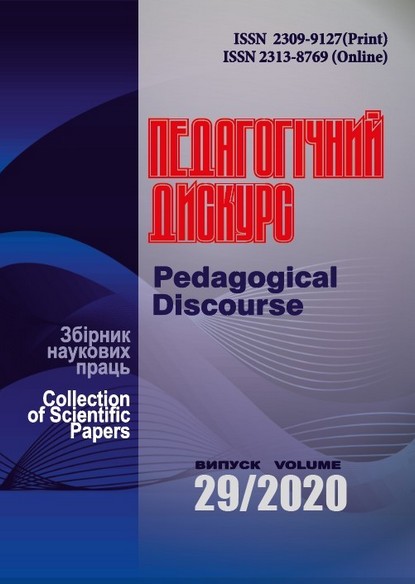Pedagogical Conditions for the Realization of Professional Training of Future Translators on the Basis of the Integrative Approach
Abstract
The article substantiates the pedagogical conditions for the implementation of professional training of future translators on the basis of an integrative approach. It is proved that for the professional training of future translators it is necessary to focus on professional integration of knowledge and skills; ensure the integration of professional training of translation specialists; implementation of integrated content, methods and forms of implementation of the integrative approach in training for the students of the specialty "Philology). It is noted that one of the tasks of improving the professional training of professional translators is the formation future translators’ professionally-oriented lexical awareness. The professional skills of a translator are found to be flexible and successful in performing professional duties in non-standard, unusual, diverse situations. It is determined that one of the main functions of a translator's professional activity is communicative. The article justifies the pedagogical conditions of professional training of future translators based on an integrative approach aimed to ensure internal professional integration of knowledge and skills of linguistic disciplines (general foreign language subsystem of the professional training for a future translator), the provision of external professional integration of the knowledge and skills of the professional foreign language training, the formation of an integrated training system of a future translator. The article shows the features of the integration of knowledge and skills for future translators such as the integration of knowledge and skills in foreign languages learning, which helps to optimize the theoretical and practical components of the future translators training; the doubled integration of knowledge and helps to update the content of the professional training; the provision of the constant updating of knowledge and skills of languages by the specialist in translation.
Downloads
References
Bolotna, T., & Zubrytska, O. (2007). Linhvistyka ta krainoznavchyi aspekt u vykladanni anhliiskoi movy [Linguistics and Ethnographic Aspect in Teaching English]. Retrieved from http://www.rusnauka.com/20_PRNiT_2007/Philologia/23704.doc.htm [in Ukrainian].
Gavrilenko, N. N. (1997). Integrativnaya model’ obucheniyia perevodu. Shkola didaktiki perevoda [Integrative Model of Translation Training. School of Translation Didactics]. Retrieved from http://www.engectver.ru/Konferenciya/4s/gavrilenko.php [in Russian].
Honcharenko S. U. & Kozlovska I. M. (1997). Teoretychni osnovy dydaktychnoi intehratsii u profesiinii serednii shkoli. [Theoretical foundations of didactic integration in vocational high school]. Pedahohika i psykholohiia – Pedagogy and Psychology, 2, 9–18 [in Ukrainian].
Grebennikov, A. V. (2012). Rol’ integrativny’x kursov v razvitii samoorganizacii obuchayushhixsya [The Role of Integrative Courses in the Development of Students’ Self-Organization]. Istoricheskaya i social’no-obrazovatel’naya my’sl’ – Historical and Socio-Educational Thought, 4, 99–101 [in Russian].
Dolynskyi, Ye. V. (2013). Pedahohichni umovy formuvannia informatychnoi kompetentnosti maibutnikh perekladachiv pry vyvchenni inozemnoi movy [Pedagogical Conditions for the Formation of Information Competence of Future Translators in the Study of a Foreign Language]. Vyshcha osvita Ukrainy – Higher education of Ukraine, 2 (2), 371–377 [in Ukrainian].
Kozlovska, I. M. (2008). Metapredmetna intehratsiia u zmisti profesiinoi osvity [Meta-Subject Integration in the Content of Vocational Education]. Lviv: Spolom [in Ukrainian].
Kolodii, I. A. (2009). Aspekty formuvannia intehralnoi profesiinoi kompetentnosti u maibutnikh perekladachiv aviatsiinoi haluzi [Aspects of Formation of Integrated Professional Competence in Future Translators of the Aviation Industry]. Visnyk pisliadyplomnoi osvity – Bulletin of Postgraduate Education, 11 (1), 112‒118. Retrieved from: http://nbuv.gov.ua/UJRN/Vpo_2009_11%281%29__16 [in Ukrainian].
Komissarov, V. N. (1997). Teoreticheskie osnovy’ metodiki obucheniya perevodu [Theoretical Bases of Methods of Teaching Translation]. Moscow: MHLU [in Russian].
Kopus, O. (2014). Formuvannia profesiinoi movlennievoi kompetentnosti maibutnikh mahistriv filolohii [Formation of professional speech competence of future masters of philology]. Teoretychna i dydaktychna filolohiia – Theoretical and Didactic Philology, 18, 45–51.
Lavrynenko, O. O. (2011). Metodyka vykladannia perekladu [Methods of Teaching Translation]. Kyiv: KyMU [in Ukrainian].
Laty’shev, L. K., & Provotorov, V. I. (1999). Struktura i soderzhanie podgotovki perevodchikov v yazy’kovom vuze [The Structure and Content of the Training of Translators in a Language University]. Kursk: ROSI [in Russian].
Levytska, N. V. (2015). Problema profesiinoi pidhotovky perekladachiv u teoretychno-pedahohichnykh doslidzhenniakh [The Problem of Professional Training of Translators in Theoretical And Pedagogical Research]. Molodyi vchenyi – Young Scientist, 7 (2), 57–60.
Martyniuk, O. V. (2014). Stanovlennia systemy profesiinoi pidhotovky spetsializovanykh perekladachiv: dosvid SShA [Formation of the System of Professional Training of Specialized Translators: the Experience of the USA]. Visnyk Natsionalnoi akademii Derzhavnoi prykordonnoi sluzhby Ukrainy – Bulletin of the National Academy of the State Border Guard Service of Ukraine. Retrieved from http://nbuv.gov.ua/UJRN/Vnadps_2014_4_13 [in Ukrainian].
Motsar, M. M. (2018). Formuvannia polikulturnoi kompetentnosti maibutnikh perekladachiv z vykorystanniam tekhnolohii dystantsiinoho navchannia [Formation of Multicultural Competence of Future Translators with the Use of Distance Learning Technologies]. (Doctor’s thesis). Kyiv [in Ukrainian].
Nakaznyi, M. O. (2015). Zmistova model orhanizatsii pedahohichnoi praktyky dlia studentiv napriamu «Pereklad» u vyshchomu navchalnomu zakladi [Semantic Model of Organization of Pedagogical Practice for Students in the Field of «Translation» in Higher Education]. Innovatsii u vyshchii osviti – komunikatsiia ta spivpratsia u suchasnomu universytetskomu seredovyshchi za dopomohoiu spetsyfichnykh tsyfrovykh instrumentiv – Innovations in Higher Education – Communication and Cooperation in the Modern University Environment with the Help of Specific Digital Tools. Dniprodzerzhynsk: DDTU [in Ukrainian].
Pavlyk, O. B. (2004). Profesiino-pedahohichna pidhotovka maibutnikh perekladachiv do vykorystannia ofitsiino-dilovoho movlennia [Professional and Pedagogical Training of Future Translators for the Use of Official Business Speech]. (Candidate’s thesis). Khmelnytskyi [in Ukrainian].
Porshneva, E. R. (2004). Mezhdisciplinarny’e osnovy’ bazovoj lingvisticheskoj podgotovki specialista-perevodchika [Interdisciplinary Bases of Basic Linguistic Training of a Specialist Translator].(Doctor’s thesis). Kazan [in Russian].
Rebrii, O. V., & Panchenko, O. I. (2005). Metodyka pidhotovky navchalnykh materialiv dlia maibutnikh perekladachiv [Methods of Preparation of Educational Materials for Future Translators]. Vcheni zapysky – Scholarly Notes, 2, 497–505 [in Ukrainian].
Sokolova, I. V. (2008). Profesiina pidhotovka maibutnoho vchytelia-filoloha za dvoma spetsialnostiamy [Professional Training of Future Teachers of Philology in Two Specialties. Dnipropetrovsk [in Ukrainian].
Copyright (c) 2020 Pedagogical Discourse

This work is licensed under a Creative Commons Attribution-NonCommercial-ShareAlike 4.0 International License.

















